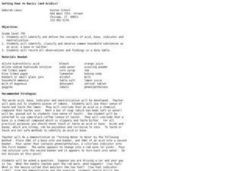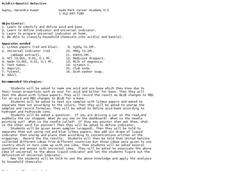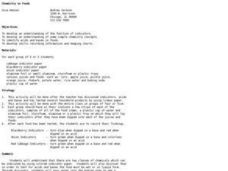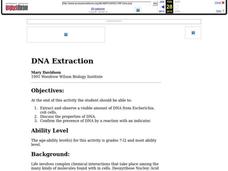Curated OER
2003 U.S. National Chemistry Olympiad Part III
In this chemistry Olympiad worksheet, pupils are given 2 lab problems to work on. They must explain their experiment they would carry out, show their data and write their results and conclusions of the lab and the process.
Curated OER
Chemical Changes Making Foam and Using Indicators
Students are able to observe chemcial and physical changes while producing a brilliant formation of foam. They are able to experience the use of an indicator in the reaction. Students record information based on their observations.
Teach Engineering
Basically Acids
Base your lesson plan on acids and bases on an informative resource. The first installment of a five-part module on the science behind Harry Potter has individuals investigate acid/base chemistry with the use of invisible inks. They also...
Curated OER
Determination of Water Hardness
Students investigate water hardness. In this water hardness lesson plan, students determine the water hardness in 4 samples of water after buffering each. By using titration and an indicator, students can determine the amount of calcium...
Curated OER
RHS Campaign for School Indicator
Students study Ph and how acids and bases can affect it. In this indicators lesson students divide into groups and complete a lab activity to investigate what happens when they add indicators.
Curated OER
Making Soap
Students explore what chemical indicators are and use pH paper to determine if something is alkaline or basic. In this pH instructional activity students manufacture their own soap.
Curated OER
Cool Chemistry- DIY pH Indicator
Students study the differences between an acid and a base. In this pH lesson students view a demonstration then test chemicals in groups.
Curated OER
The Burette
In this burette use worksheet, students are given directions for performing a titration using a burette. Students practice reaching the end-point oftitrations and they calculate the mean volume of three trials.
Curated OER
How to Use the Burette
In this burette worksheet, students learn how to properly use a burette to perform a titration and they run 4 trials and indicate their data. Students find the initial volume, the final volume, the titre volume and the mean titre volume...
Curated OER
Getting Down to Basics (and Acidics)
Seventh graders investigate acids and bases. In this acids and bases lesson, 7th graders use household items such as coffee, lemons and soap to define acids and bases. They observe a demonstration to show how indicators determine if a...
Curated OER
Acid(s)-Base(s) Detective
Students investigate acids, bases, indicators and universal indicators. In this acid and base lesson plan, students test 6 samples with litmus paper and determine if they are acids or bases. They separate out 7 samples using litmus paper...
Curated OER
Chemistry in Foods
Students investigate foods that are indicators, and acids and bases. In this food chemistry lesson plan, students test household products with litmus paper and with food indicators. They use blackberry, onion and red cabbage indicators...
Curated OER
Properties of Soaps
Students investigate 3 types of soap. In this properties of soaps lesson plan, students test soap with pepper and observe the reaction between the two. They make observations of the 3 types of soaps and make a chart to compare each. They...
Curated OER
Acids, Bases and Indicators
Students investigate the pH of various solutions with indicators. In this acids, bases and indicators lesson plan, students use a variety of indicators to test solutions for their pH. Students determine which indicators are the best to...
Curated OER
Acid/Base Indicators
Students use plant materials as indicators of acids and bases. In this acid/base indicators lesson plan, students use boiled beets, cabbage, flowers, teas or berries that have been boiled with alcohol to test various acids and bases....
Curated OER
The Difference Between Acids and Bases Using Different Indicators
Students identify the differences between acids and bases. In this acids and bases lesson plan, students identify and distinguish between acids and bases. They use household products to test the ph levels. They test the ph levels by...
Curated OER
Indicators For Acids and Bases
Fourth graders compare the color of cabbage water when acids and bases are mixed in. In this acids and bases lesson plan, 4th graders use cabbage water and mix in acids and bases that the teacher prepares before hand. They observe the...
Curated OER
Investigating Buffers
Students investigate buffers and their behaviors when used with acids and bases. In this buffers lesson plan, students use a pH meter and create buffered acidic and basic solutions. To each of the buffered solutions students add strong...
Curated OER
pH Lab
In this pH worksheet, students experiment with dilutions of acidic solutions to test for the pH using cabbage as an indicator. They then test a variety of substances for pH. On day two of the lab, they test conductivity of solutions and...
Curated OER
More Acid-Base Indicators
Students explore acids, bases, and indicators. They use turmeric solution, phenolphthalein, and goldenrod paper to determine the acidity and basicity of a variety of common household substances. A worksheet is included to record test...
Curated OER
The Blue Bottle: An Example of Teacher-Guided Inquiry
Learners observe a demonstration in which a bottle containing a colorless solution is mixed, turns blue, then becomes colorless again. They record observations, form and discuss hypotheses, and draw a conclusion based on the evidence.
Curated OER
Invisible Ink
Students wxplore acids and indicators by watching a demostration in which "magic" ink appears. They duplicate the demonstration by writing magic messages using phenolphthalein solution and painting the message with vinegar to show it.
Curated OER
Colorful Milk of Magnesia
Students explore acids, bases, and indicators. They observe the various colors of an acid-base indicator solution and the neutralization of an acidic solution by an antacid.
Curated OER
DNA Extraction
Students are able to extract and observe a visible amount of DNA from Escherichia coli cells. They discuss the properties of DNA. Students confirm the presence of DNA by a reaction with an indicator.

























